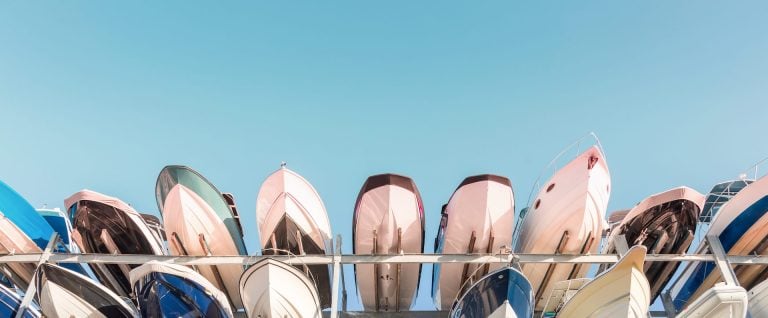You might not consider yourself a very superstitious person, but chances are you observe some without a second thought. When was the last time you walked under a ladder or opened an umbrella indoors?
You might be here, reading this article, because you’ve innocently broken one of the cardinal rules of the water: never bring bananas on a boat.
It sounds silly, but it’s a superstition that’s so old and ingrained in fishing and boating culture that it’s hard to pinpoint exactly what inspired it. There are many theories, all of which work together to explain the real-life dangers of the banana that turned it into a symbol of bad luck.

Although the superstition seems to have spread to other types of boats as well, it’s closely tied to fishing boats and the belief that you won’t catch any fish if there are bananas on board. The internet is filled with tales of strict fishing boat captains confiscating bananas (and banana-related items) from passengers and throwing them overboard before setting sail. Many an ill-fated fishing trip, from days when the fish didn’t bite, to near-disasters involving leaking boats, faulty motors, and violent storms, have been blamed on the deceptively innocent Yellow Fruit.
The banana ban can probably be traced back to various legends and superstitions held by cultures throughout the Pacific, including Hawaii and Polynesia. The belief that bananas only spell disaster for fishing boats seems to have been firmly established in European culture by the 1700s.
Bananas earned a reputation — deservedly or not — for causing nothing but trouble on board wooden cargo ships. Were they really bad luck, or were they actually just bad for the health of the crew? Let’s take a look at some of the hazardous, inconvenient, or even innocent things bananas did that gave them a bad name.
Surviving shipwrecks
Like the Robinson Crusoe of fruit, bananas were notorious for surviving shipwrecks. Imagine sailing along the high seas and coming upon a large patch of floating bananas, one of the only indicators that something had gone awry with whatever boat they were on. Bananas aren’t particularly sinister on their own, but floating in all their yellow glory above a watery grave? Pretty ominous.
Releasing Methane Gas
Bananas release methane gas as their juices ferment, which isn’t inherently toxic unless it replaces oxygen in an enclosed space (like a ship’s hold). Methane gas is also flammable and can self-combust. Methane wasn’t discovered until 1776, making this phenomenon even more unnerving for colonial crews. Various legends blame bananas for fires, explosions, and gas poisonings, and while they might be more fiction than fact, they’re all serious disasters no responsible captain would want to risk.
Bringing unwelcome passengers
No one wants to share a boat with poisonous spiders, snakes, scorpions, termites, and other pests, but unfortunately, they sometimes came as a packaged deal inside bunches of bananas. The bananas you get at the supermarket are innocent enough, but there was a time when crew members were dying from poisonous bites and termites were chewing away at ships. And if that’s not reason enough to ban bananas, what is?
Spoiling too fast
Bananas start to ripen quickly, and traveling by sea took a lot of time. Merchant ships carrying bananas would sail faster in order to get to port before their cargo spoiled. If they were too slow, the bananas would start to rot, filling the ship with an awful smell. If they were fast enough to save the fruit, the boat moved too quickly for the crew to be able to catch any fish to eat — likely inspiring the notion that bananas on board were bad for fishing.
Spoiling other food
In addition to methane, bananas also release ethylene gas, which makes other fruit around them ripen more quickly along with them. This was an issue for — and likely contributed to the superstitions of — both the Pacific Islanders and the European merchants. Other cargo and provisions would spoil faster than usual, which wasn’t only inconvenient, but also dangerous. No one wants to be in the middle of the ocean with rotten bananas and a spoiled food supply. Starving sailors likely become resentful of the bananas, and can you blame them?
Being a cliché hazard
Slipping on a banana peel seems like an overdone comedy gag now, but according to one of the flimsier theories, it was an issue on cargo ships with messy crew members. Everyone could have simply cleaned up after themselves, but why do that when you can just get rid of the Evil Fruit all together? Bananas seemed to be causing enough problems as it was and another strike against them could only help the banana ban to take further hold.
Offending the fish
According to some fishermen, fish don’t like the scent of bananas and would be repelled if the fishermen or the boat smelled like them. (Or perhaps crews just got sick of the smell of bananas.) Scent does matter to fish — according to Bass Resource, fish have a sense of smell 1,000 times better than dogs. They may have come to associate the scent of bananas with fishermen and scattered. Whether they actually disliked bananas, however, is unknown.

Fast-forward to the twenty-first century, and many fishermen and boaters are still strongly against bringing bananas on board. The fruit, however, has become less of a safety hazard and more of a jinx. Some people believe the banana’s bad luck goes beyond the fruit itself and extends to all banana-related things. The list includes:
For sailors and fishermen hundreds of years ago, it’s clear bananas weren’t just a sign of bad luck, but were inconveniences at best and deadly hazards at worst. The superstition is now firmly entrenched in boating life and you’d be wise to remember to leave them at home on your next fishing trip. At the very least, don’t try sneaking bananas on board someone else’s boat, or you might get blamed for anything and everything that goes wrong.
For other (and perhaps more practical) tips on boating, check out our blog.


